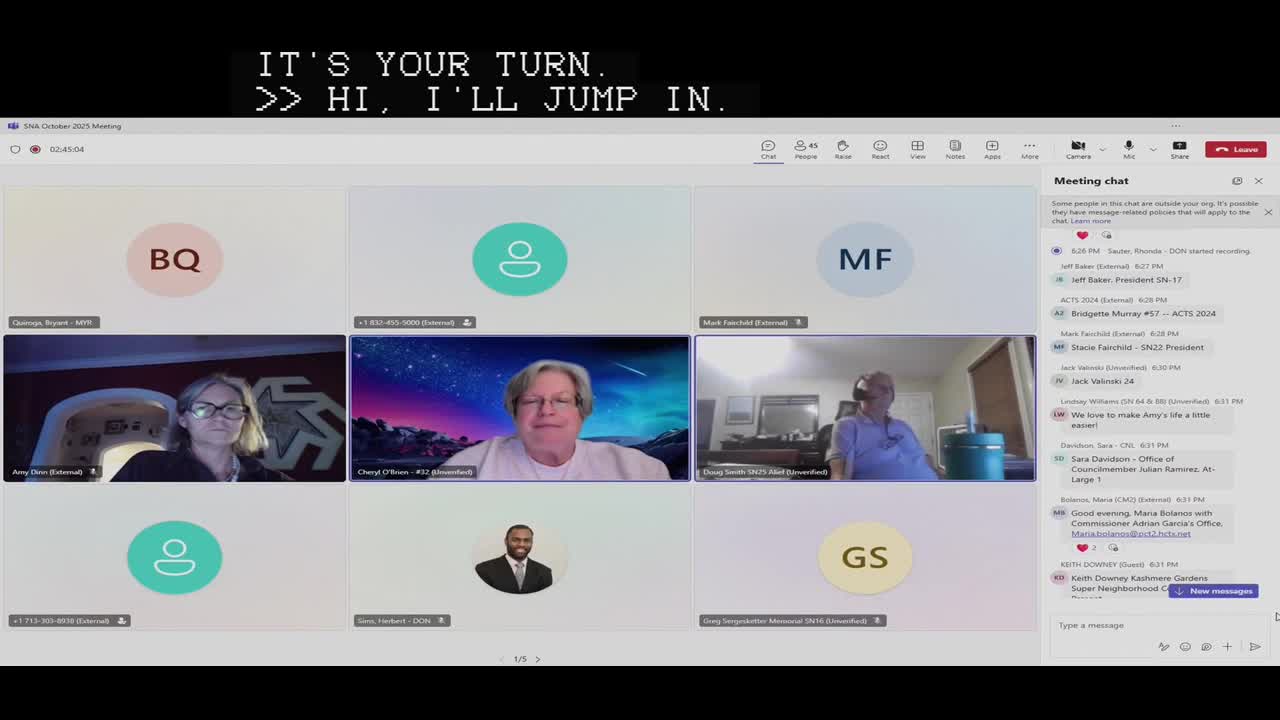Harris County DA’s Domestic Violence Bureau outlines protective-order services, outreach plans to Super Neighborhood Alliance
Get AI-powered insights, summaries, and transcripts
Subscribe
Summary
Mary McFadden, chief of the Harris County District Attorney’s Domestic Violence Bureau, told the Super Neighborhood Alliance about the bureau’s staffing, caseloads, protective-order limits and plans to expand community-based advocacy and co-located services.
Harris County District Attorney Mary McFadden’s Domestic Violence Bureau told the Super Neighborhood Alliance on Oct. 15 that it prosecutes felony family-violence cases, files civil protective orders at no cost and is expanding outreach so survivors can access protective orders and related services outside downtown courts.
McFadden, chief of the bureau that launched Jan. 1, 2025, said the office has “about 70” staff, roughly one-quarter of whom are attorneys, and that the unit files about 15,000 family-violence–coded cases a year, with roughly half of those treated as felonies (about 7,500 felony filings annually). She described the bureau’s work, protective-order process and the limits that often prevent survivors from getting longer-term court-ordered protection.
Why it matters: The DA’s office is a primary criminal-justice intervention for survivors in Harris County. McFadden’s presentation explained where the DA can and cannot act — such as time limits on protective orders and the need for good service addresses — and outlined the bureau’s plans to place advocates in neighborhoods to reduce logistical barriers to safety.
McFadden said the bureau handles felony-level family-violence matters across a wide range of offenses, from repeat assault to aggravated assault and homicide, and focuses a smaller group of prosecutors specifically on intimate-partner violence. “We file about 15,000 cases a year,” she said, adding that coding practices mean some violent offenses that are not assigned a family-violence code are not captured in that number.
She described a high-risk team of advocates who conduct lethality or danger assessments and can refer people into a countywide Domestic Violence High Risk Team (DVHRT) coordinated by the Harris County Domestic Violence Coordinating Council. Those high-risk referrals, she said, can trigger immediate law-enforcement protections: McFadden recounted a case where a high-risk survivor received 24-hour law-enforcement postings after a deadly threat.
On civil protections, McFadden explained that the bureau files civil protective orders free of charge and will represent applicants in court, but protective orders have limits: “The protective order through a criminal case is only at very, very max 121 days. Minimum is 61 days. Max is 121 days.” She also said bond conditions in a criminal case can extend protective conditions beyond that period but that bond conditions are set by judges and are case-dependent.
McFadden emphasized service requirements as a practical bottleneck: the office must be able to serve the respondent with paperwork for a civil protective order to proceed. “If we don't have a good address for that person... we're not ever going to get that protective order,” she said, noting service problems when respondents are unhoused or live out of state.
On immigration, McFadden told attendees the bureau does not ask an applicant’s immigration status and that the office will pursue protective orders and criminal charges for victims regardless of status. “We never have asked a person's status. We don't plan to ask a person's status,” she said.
Implementation and outreach plans: McFadden said the bureau received supplemental funding from the commissioners court to add advocates, with the intent to co-locate advocates in neighborhood sites — for example, the Bridge in Pasadena, Bay Area locations or management-district facilities — to meet people where they are and reduce the need to travel downtown. She also said the office can staff resource tables and presentations at community events and encouraged Super Neighborhoods to contact Sherry Cortez, the bureau’s community outreach coordinator, to arrange tabling or presentations.
Q&A highlights: Attendees asked whether the DA handles presentation requests (McFadden: yes; contact Sherry Cortez) and whether her office provides post‑case services (McFadden: the DA must outsource most long-term survivor services and aims to make those referrals earlier in the process). A question about calls to Houston Police Department was answered by McFadden with caution: she said DV calls are high but that she could not confirm the precise share of HPD calls related to family violence.
Ending: McFadden asked neighborhood leaders to spread accurate information about how to get protective orders and reassured attendees that the DA’s office aims to represent survivors “free of charge” in civil protective-order filings. She closed by offering to coordinate further outreach through her staff to bring services and tabling to neighborhood events.
